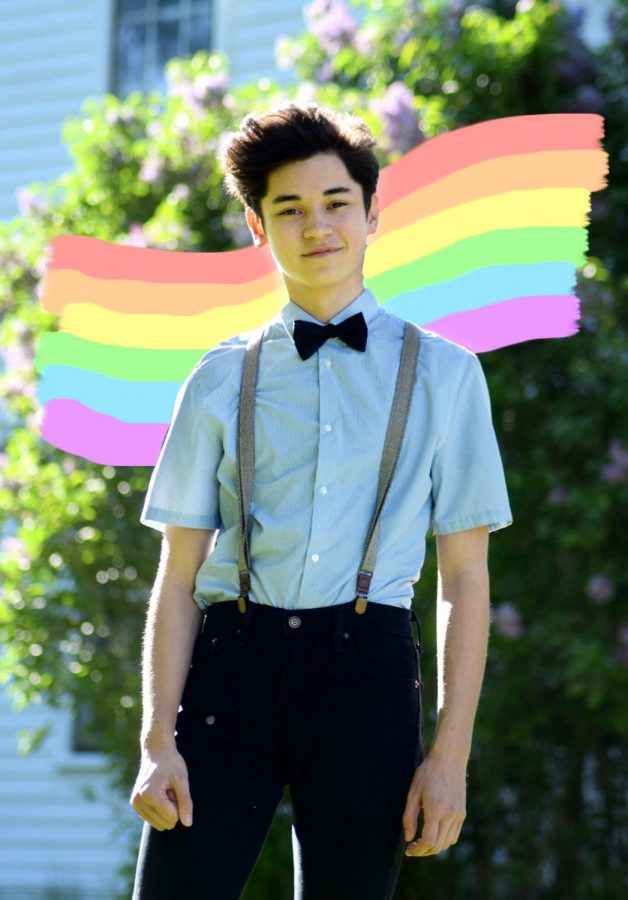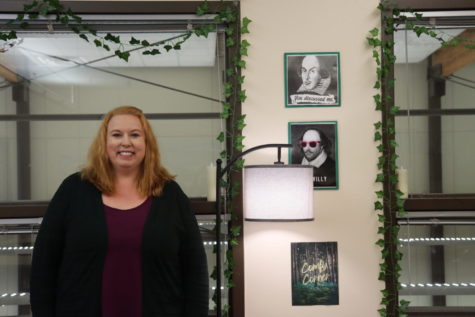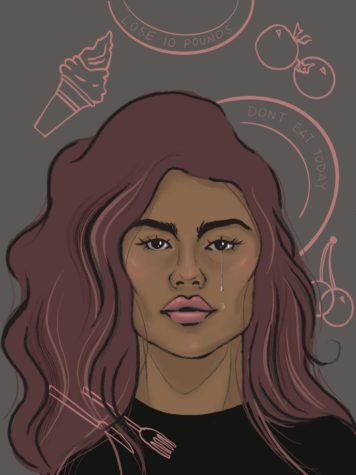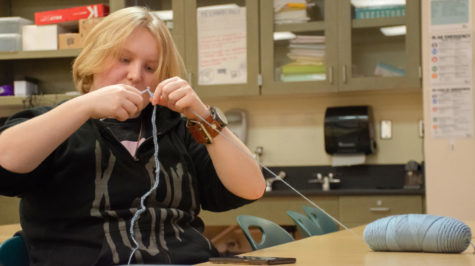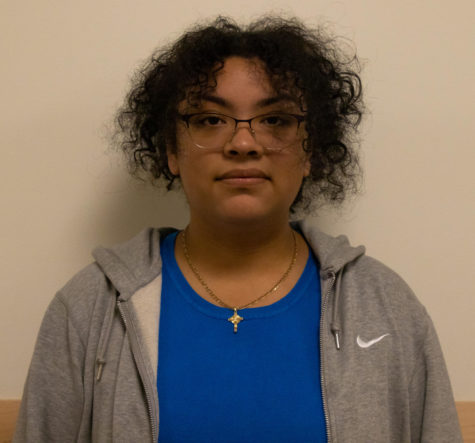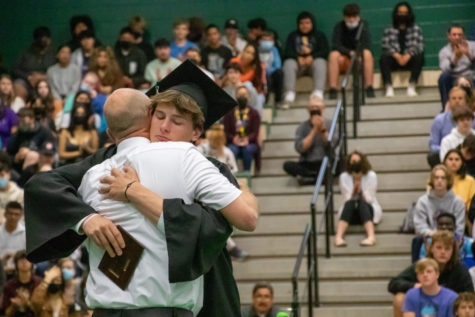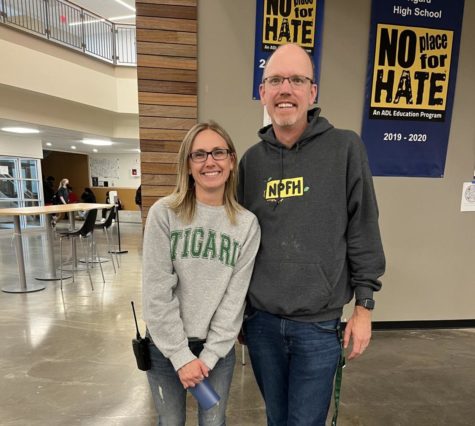Nothing but Pride
Senior Daniel Au proudly shares his identity and continues to embrace it, despite struggles he faces at home.
Although it is common knowledge among his peers that he is gay, this identity is something that is only embraced outside of his home. At home, Au is still struggling to be accepted for who he is.
June 7, 2019
This story appeared in our Senior Magazine for 2019.
Many people at Tigard High recognize his name and even his voice as one of the eight speakers at the Human Rights assembly. Senior Daniel Au was able to share a glimpse of his experience coming out and his struggles since that time. Although it is common knowledge among his peers that he is gay, this identity is something that is only embraced outside of his home. At home, Au is still struggling to be accepted for who he is.
“The only time I have faced homophobia has really been from my family; for the most part, my identity is a taboo topic that isn’t brought up that much [at home],” Au said. “In the past, my mom would show me stories or testimonies of people who came out of homosexuality and became ‘normal’ again.”
Au’s mom discovered her son’s sexuality in February of 2018. She took him to visit their church in the midst of his junior year and read through verses about his sin, hoping to find ways to cure his problem.
“She kept telling me that I wasn’t gay and that this was Satan lying to me. And at that moment, I felt like she was right,” Au said. “I felt so cathartic after they prayed for me, and I was crying. I thought that I could really pray my gayness away and that everything would go back to normal.”
But his feelings of relief were short lived.
After the church visits, Au’s mom also decided to relocate him to live closer to her in Roseburg, Oregon.
“At that time, I was living with my aunt because my mom recently married someone who lived in Roseburg,” Au said. “My mom then went through my phone, and although she didn’t find out right away, she figured out that I was having a relationship with a guy at school.”
Without further discussion, Au found himself completely relocated in a new school and town with the intent of encouraging him to stop being gay. One of Daniel’s sisters, who asked to remain anonymous, commented on the decision. She was unable to prevent this choice in person when it was made.
“I wholeheartedly accept Daniel for who he is; I am probably the only person in our family who does. I personally was deeply upset by this event, and I told our mom I didn’t agree with her decision,” she said. “They had an ideological disagreement around identity, and our mom wanted to have Daniel living with her in Roseburg to exert more control over his environment.”
She knows her family dynamic is unique because they have ideological beliefs that dispute each other.
“My mom loves Daniel and he loves her too, but there are ideological struggles that cause complications in the relationship,” she said.
His other family members recognized that his relocation was a problem, because it brought several detriments to his school performance and overall well being. Au’s father, Jim, was also surprised by the decision, which further increased the support to find ways to get him back.
“Since 2009, when he was eight, I have lived apart from him in Los Angeles. In order to keep and build our relationship as father and son, I made numerous visits to Portland each year starting in 2010, and always made a point to spend time with him,” Jim said. “I knew he was excelling in everything he was doing at THS, in particular that he loved theater, choir, and Japanese, and was taking IB classes which do not exist in Roseburg.”
When Au was placed into the new environment, almost four hours away from Tigard, it was far from what he had anticipated. On his first day, he was introduced to several people who were not straight and completely contradicted what his mom wanted. “My mom loves Daniel and he loves her too, but there are ideological struggles that cause complications in the relationship.”
“Generally, the atmosphere was super supporting of me being gay, and it was really common to not be straight,” Au said. “A lot of people were super sympathetic to my story.”
Au kept in contact with several friends and choir teacher, Robert Hawthorne. He was one of the first people to be notified of the decision.
“Aside from strategizing, Hawthorne also got choir members and theater people to write me letters showing their support,” Au said. “I think I received around 53 of them. It was really encouraging to me, because this was such a difficult time and I needed that support.”
This continued for over a month, as Au would communicate back and forth between Hawthorne and other friends to find ways to get him back to Tigard High. One of the most difficult parts for Au was the constant feeling of being a problem, and finding ways to cope with not being able to go back to Tigard.
“I would argue with my mom and give her reasons why I should go back,” Au said. “That was hard because never had I wanted to defy my mother, since I never made a fuss about anything.”
One idea that was offered was to find a home in Tigard that Au could live in that met the standards of his mom and would help transition him away from homosexuality. Au asked relatives, his previous neighbors and families his parents knew to find ways to live back in Tigard with supervision.
“After a while, I started to feel hopeless that nothing was going to change, and I could never go back to my old life and friends,” Au said. “Ultimately, I learned that I wasn’t wrong, and I couldn’t be straight no matter what.”
When Au returned to Tigard, he was told to follow rules that would prevent him for participating in after-school activities as well as the theatre program. The academic consequences from the short removal had lasting effects on his future classes and plans.
“I was able to keep my car and phone for safety and transportation purposes, but I wasn’t allowed to participate in afterschool activities. I missed the musical, solo ensemble and getting a college mentor,” Au said.
Au and his mom are living under the same roof again. Although Au continues to face adversity from his family, he plans to embrace his sexuality regardless of what they think.
“I can’t convince my mom that it isn’t wrong to be gay, so I just ignore it. I can get along with her, but I don’t think I would tell her any of my secrets or personal details in my life,” Au said.
The time in Roseburg was an intense period of introspection for Au.
“I stayed relatively the same throughout the entire process of the move, but for a while I was questioning if it was a sin to be the way I am,” Au said. “I am pretty much through with it, but I still have many lingering thoughts about it. I have been raised to believe that stuff my whole life.”
For the future, Au plans to pursue music in college, specifically composing and vocal performance.
“When I was younger, I always thought that I would go for computer science. After taking choir and other music classes, it sparked my interest in a career with music,” Au said. “I am still considering options within computer science, but I plan to study at PSU for a Bachelor’s in music.”
When asked to describe Daniel, his sister stated that he was “brilliant, creative, musically talented and autodidactic,” someone that is likeable and easy-going. She continues to support his decision to identify as gay and offers him advice whenever he needs it. Overall, she recommends that anyone in a similar position as Daniel should be confident in their choice and remain resilient to anyone who opposes their identity.
“Build a life you don’t have to regularly escape from, even if that means creating space between you and the source of conflict,” she said.


